China is one mythical place that is rich in history and some of the most intriguing cultural and societal beliefs, but even more astonishing of what Chinese cultures have to offer is the Chinese Mythology. Some of the most interesting stories about historical beings, unicorns, dragons, and even gods and goddesses often have roots in Chinese Mythology. So, this article takes you through everything you need to know about Chinese mythology and why they are an important part of Chinese culture. So, let’s jump right to it!
Mythological Chinese Meaning
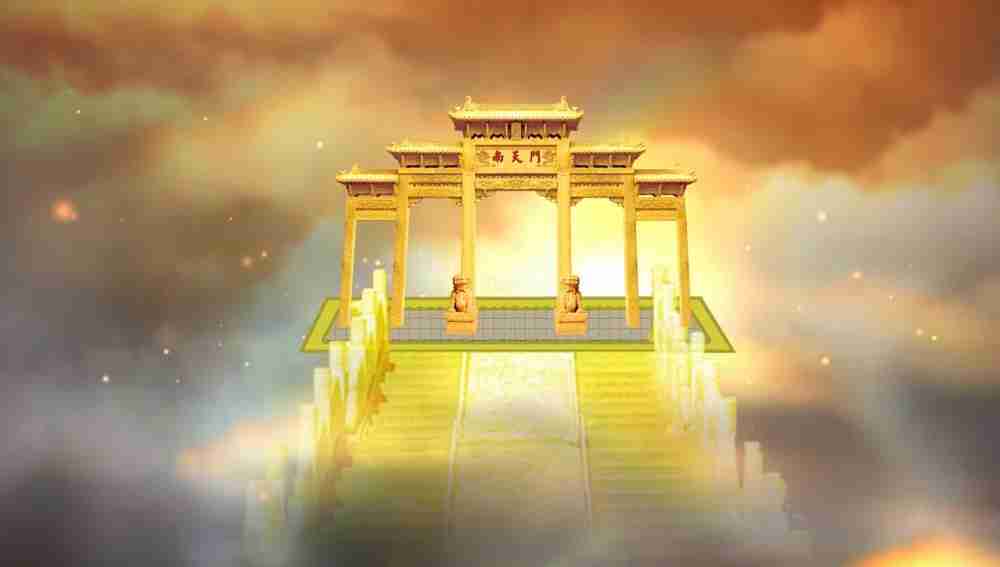
What Is Chinese Mythology? Chinese mythology can be defined as mythology passed down through oral or written/ recorded literature in specific areas of the world, but in this case, recorded in China. Notably, China boasts rich cultures and traditions, which is why it doesn’t come as a surprise to learn that China has quite a bit to offer in terms of mythology.
It’s important to note that Chinese mythology encompasses different cultural elements as well as varied myths from different regions and even cultural traditions. A huge chunk of Chinese mythology is, however, focused on exciting and mindblowing stories around fantastic people and magical beings. There is also the use of magical powers to a rather large extent, and especially around creatures/ beings and events taking place in different exotic and mythical places at different times.
And just like other mythologies from around the world, Chinese mythology has been believed widely in the past as actual factual recordings of history. Alongside Chinese folklore, the mythologies all form a large part of the Chinese folk religion.
It’s important to note, however, that many of the stories around the events and the characters of the distant past tend to have what is called a double tradition – this is the tradition that presents more of a euhemerized or a historicized version of things, and one that comes off as more of a mythological version of things. Most of the myths in Chinese mythology tend to involve creation stories and the universe’s cosmology, along with the different deities and inhabitants from the past days. Some of these mythological stories also involve creation myths, as well as the origin of people, cultures, and things, and even the origin of the Chinese state. And while most of these myths are seen in the actual present chronology of prehistoric times, a number of them involve specific culture heroes that taught people different things or were an ancestor of a certain dynasty family or ethnic group.
The other notable thing about Chinese mythology is the fact that most of the time, Chinese mythology is tied to some ritual acts like ceremonies, dances, and even sacrifices.
Chinese Mythology History
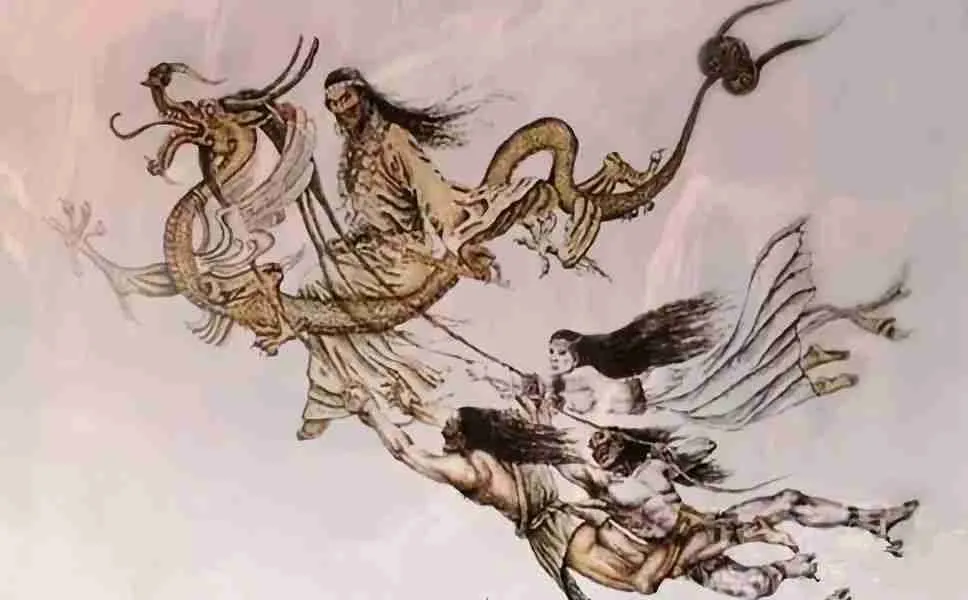
As mentioned above, Chinese mythology is more or less a collection of cultural history, religious traditions, and folktales that have been passed down generations for centuries in either written or oral forms. But never stopped to think about the history of Chinese Mythology.
Well, for the most part, Chinese mythology stems from general concerns around morality and societal issues, and they inform individuals about their cultures and values; and there are some factual recordings pointing to the source of these stories.
A huge chunk of the Chinese myths are said to originate from around the 12th century BCE, and for over 1000 years, they were transmitted orally before the first recordings of these myths in books like Shan Hai Jing and Shui Jing Zhu. These are the early works that are pretty much the sources of the Chinese myths that are shared today. The book Shan Hai Jing or the Mountain and Sea Scroll lay out different details about myths, religion, and witchcraft across Ancient China while also going into great detail on matters like the records of China’s geography, including seas, mountains. The book also covers things like medicine, history, customs, as well as the ethnicities of ancient times. It is, therefore, known as China’s early encyclopedia. Then you have the Shui Jing Zhu or the Commentaries on the Water Scroll that has geographical and historical records, as well as records of legends.
The other book is the Hei’an Zhuan or the Epic of Darkness that is a collection of legends in their epic form as preserved by the Han. There are other documents and also philosophical canons like the Shiji, Shangshu, Lushi Chunqiu, and Liji that details legends, heroes, and Chinese cultures.
Most of the Chinese mythology, along with the main belief systems, stem from Buddhism, Taoism, and Confucianism. It’s evident that the elements of the pre-existing mythology have been adapted into teachings and these belief systems. An example is a Taoist belief that spiritual paradise would be incorporated into mythology as a place where the deities and immortals dwell. Then you have the different myths that tend to glorify the benevolent rulers of the past – the 3 August Ones and 5 Emperors – and these became an important part of the political philosophies for Confucianism.
Chinese Mythology Gods and Goddesses List
One of the popular parts of Chinese Mythology is the Chinese traditional religion which is made popular by the fact that the Chinese religions are polytheistic, with many deities worshipped in what can be regarded as a complex pantheistic view of the divine that is inherent in the world. It is believed that the gods are principles revealing or energies that imitate and propagate the way of Heaven or Tian or the supreme god manifesting and its order. Chinese mythology recognizes many gods who are considered ancestors or even men that became deities because of their heavenly achievements. Many of the gods are also identified with constellations and stars, and the ancestors are regarded as the equivalents of Heaven among the human society, hence a means of connection back to the heavens.
The main Chinese gods are as follows:
Major Deities
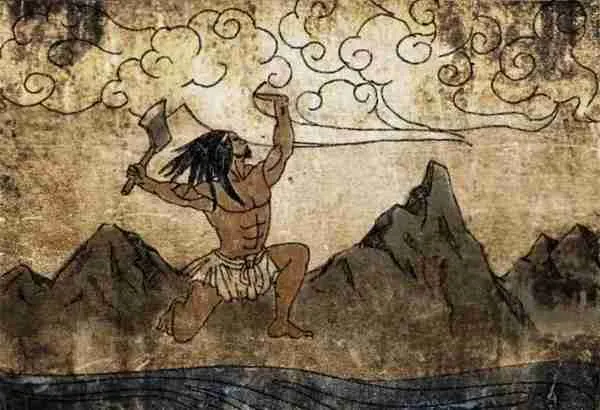
According to Chinese Mythology, Pangu is the hairy, horned beast regarded as the first living being/ thing in the entire universe. And as per the Chinese creation myth, it is said that Pangu emerged from this egg that contained the entire universe, creating the sky and earth. As a result, Pangu is also the deity associated with the concept of yin and yang.
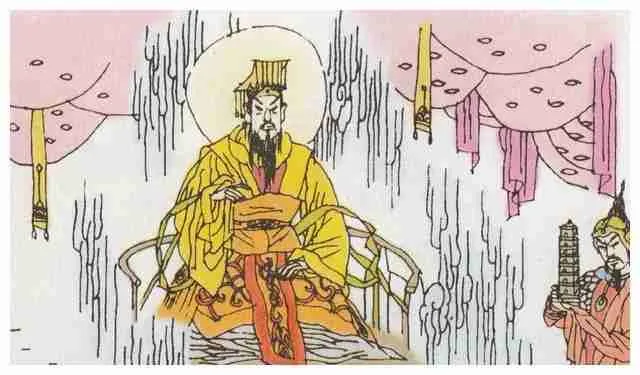
Jade Emperor is, without a doubt, the most important and also the most important figure in all Chinese mythology. The reason for this is that it is believed that the Jade Emperor is the supreme rule of Heaven and China’s first emperor. And his vast power notwithstanding, his most prominent traits include his fairness, benevolence, and also mercy. It is believed that during the New Year, the Jade Emperor judges characters of all individuals in the course of the past year, then chooses to reward or punish them accordingly.
- Xiwangmu
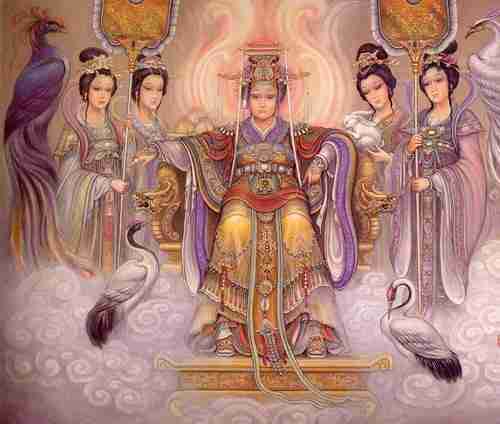
Xiwangmu, or the Queen Mother of the West, is believed to be the most powerful of all the goddesses that exist in the Chinese pantheon. This ancient deity is said to hold power over life and death. She is wife to Jade Emperor, and her work is to serve as the guardian of the Daoist women and also tending to the Peaches of Immortality. It is also believed that this goddess played a huge role in giving the human emperors what is known as the Mandate of Heaven.
- Hou Yi
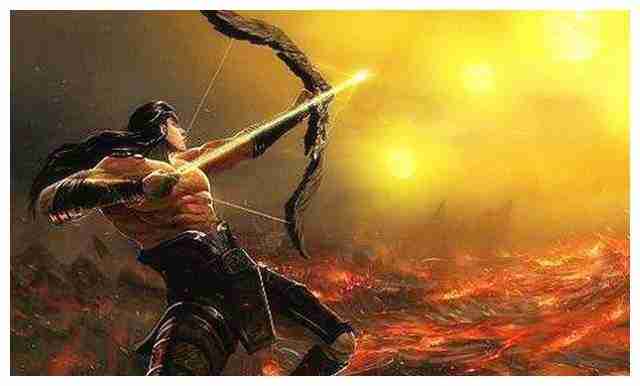
According to Chinese mythology, Hou Yi is regarded as the greatest archer to ever exist. And though he was hands down the best when it came to shooting down all nine out of the total ten suns, therefore, he saved the earth; he’s also regarded as China’s original and most notable of the original star-struck/ crossed lovers, along with his wife Chang’e!

She is the moon goddess and also the Chinese Deity known for stealing the immortality elixir from her husband, Hou Yi. Legend has it that hers is the most important story in Chinese mythology, and she is the most celebrated deity in the annual Mid-Autumn festival, which remains quite popular to date.
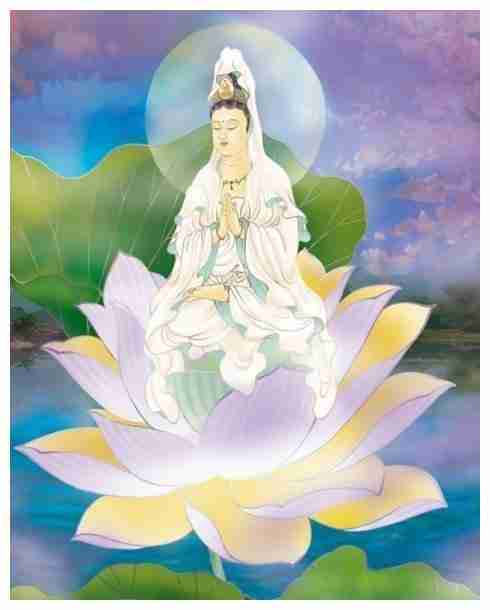
Guanyin is the goddess of compassion and mercy and is also an important figure in many of the ancient and also contemporary Chinese legends and myths. The reason for her reverence has to do with the belief that Guanyin can hear the woes and the sorrows of the world and also that she is the embodiment of grace, empathy, and kindness. Often stories about Guanyin circle and incorporate stories of her disciple and sidekick called Shancai, who was a formerly crippled Indian boy that was healed miraculously by Guanyin. With such stories, it makes sense that Guanyin’s influence and importance can still be felt to date in Chinese culture.
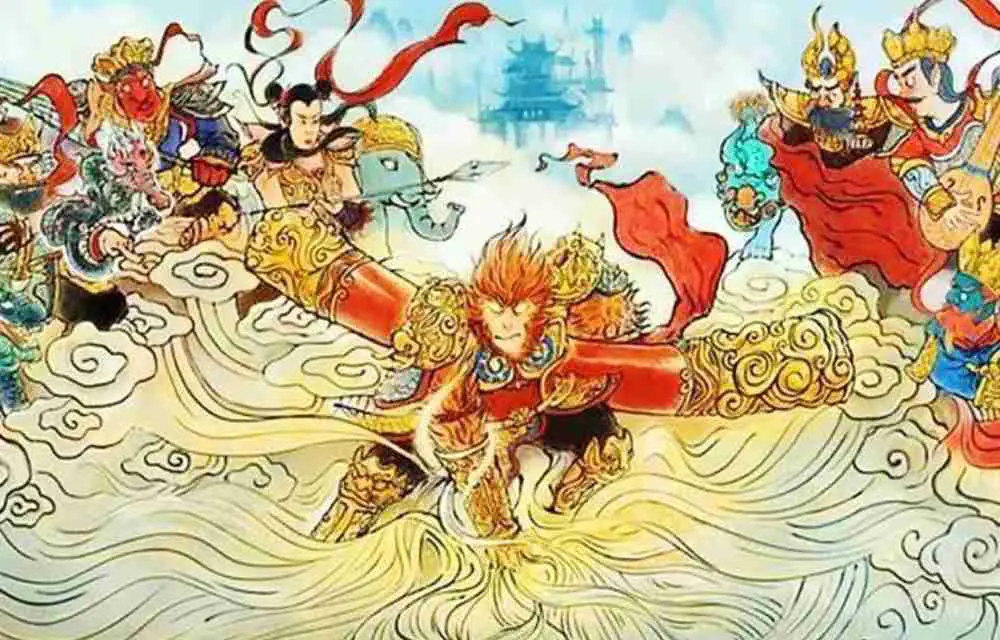
Sun Wukong is the Monkey King in Chinese mythology, the trickster god known to have played a central role in the adventurous novel called Journey to the West. While the Monkey King started out as an angry and rather impatient deity, he later achieves enlightenment, learning to live peacefully with the rest of the world.
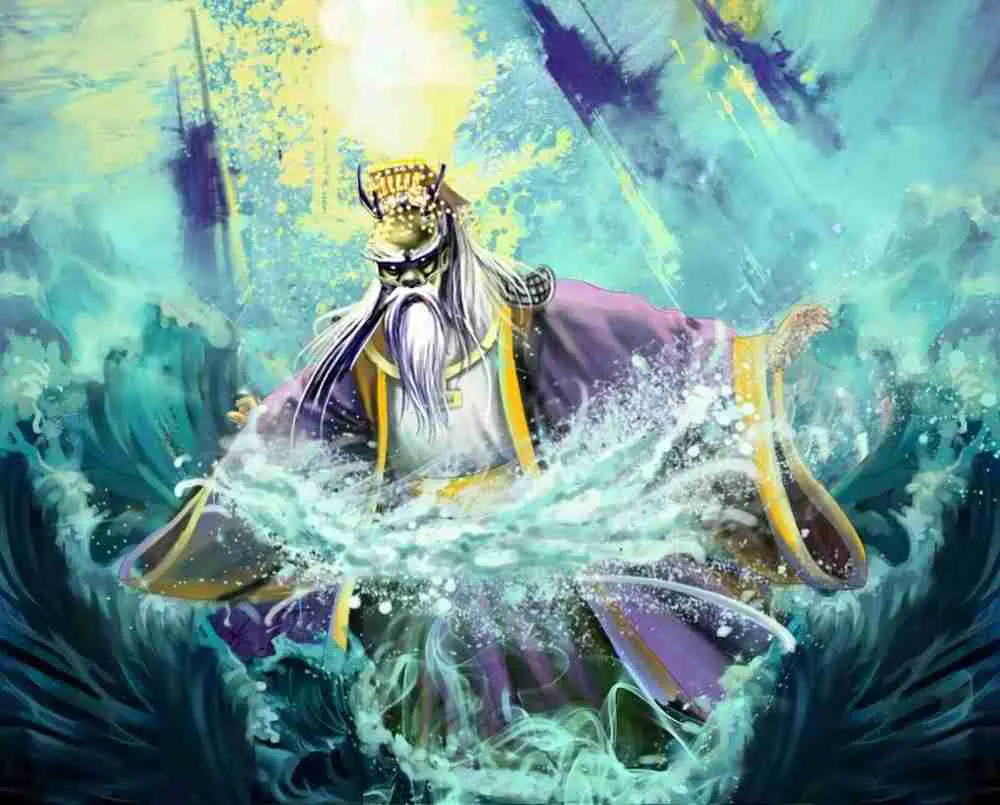
The Dragon King or Longwang is the most powerful and also the most fierce Chinese god that wielded power over the weather, the oceans, dragons, as well as creatures of the sea. The Dragon King is believed to rule over 4 of his brothers, and each of the brothers oversees the waters in the 4 cardinal points/ directions.
He’s regarded as a fearsome warrior and a mighty dragon that can be menacing and angry sometimes. Even so, the Dragon King is still considered a lucky omen, given his connection to the sea.
Other gods and goddesses include:
- Nezha – the precocious teenage deity and the patron saint for young adults.
- Zhong Kui – Also called the King of the Ghosts, a mortal original who killed himself for his unsightly appearance. He then went to hell, where his ugliness saw him being made the great ghosts and the demon hunter. He protects humans from ghosts and evil demons.
- Mazu – The Chinese goddess of the sea, the protector of travelers, fishermen, and sailors.
Eight Immortals – also called Ba Xian, the 8 immortals refer to a group made up of 8 deities representing all of the Chinese people, and each member of the group wields a specific talisman holding power to either vanquish evil or give life.
Minor Deities
These include Yan Wang (the king of Hell), Shennong (Chinese herbal medicine and the god of farming), Sanguan Dadi (trio deities that report to Jade Emperor), Zao Jun (kitchen god), Doumu (heavenly energy, benevolent and kind goddess), Caishen (Chinese go of money and wealth), Wufang Shangdi (5 collective deities or the 5 Emperors associated with specific colors), Lei Gong (god of thunder), and Leizi (goddess of the lightning).
Others include Erlang Shen, Menshen, Ji Gong, Yue Lao, Huxian, Bixia, Nuba, Wenchang Wang, Xihe, Jiutian Xuannu, Yu Shi, Changxi, Di Jun, and Lu Ban.
List of Chinese Mythological Creatures
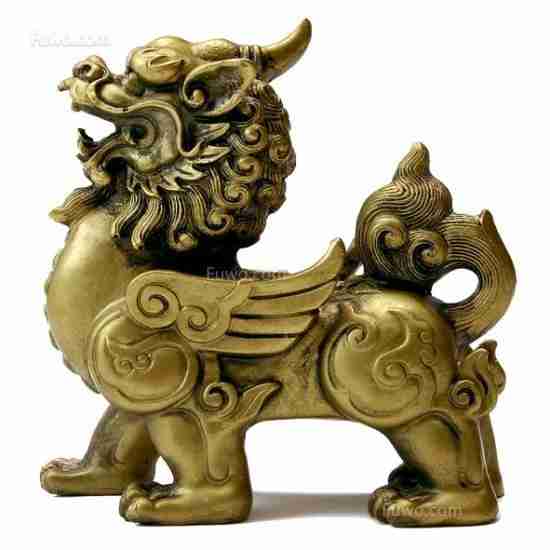
The Pixiu is depicted as some kind of winged lion with wings folded to the side of the body. This creature is considered to be one of 9 children of the loong, a creature with antlers on the head. The female pixiu has one antler while the male has 2. It is an auspicious creature that is associated with good luck. It is believed that the Pixiu devours demons and evil spirits while at the same time devouring their essence to treasure and gold, which is why the pixiu is considered a creature that brings wealth.
- Jingwei
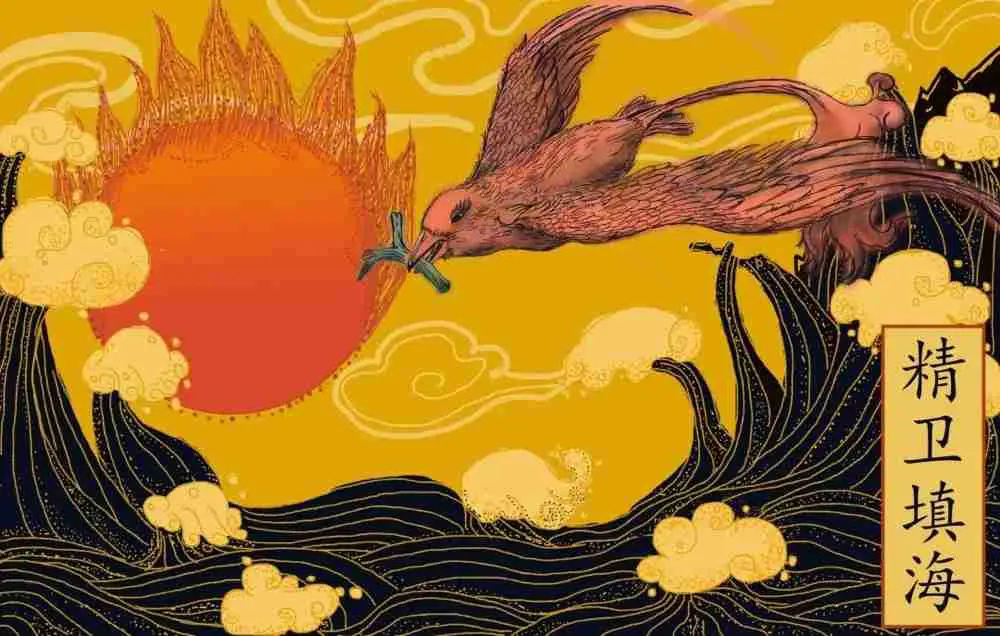
The Jingwei is a mythical bird mentioned in the Classic of the Mountains and Seas, and it’s believed to represent diligence and perseverance.
- Xing Tian
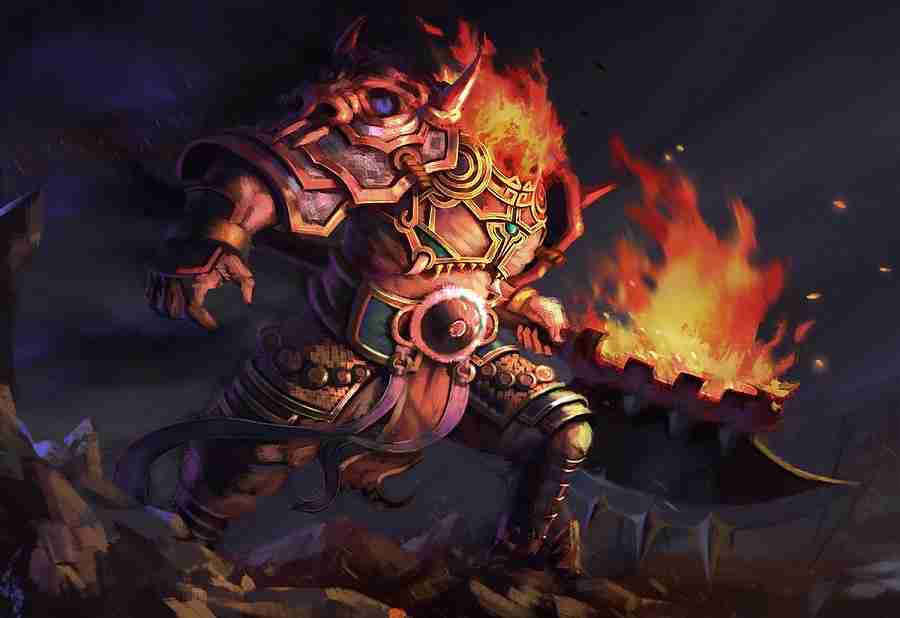
The Xing Tian is a headless creature that defied authority eternally using his shield and ax. This creature rebelled against the Yellow Emperor and was challenged to a duel. The emperor tricked him, lopping the giant’s head with a single stroke of the sword.
- The Nine-Tailed Fox
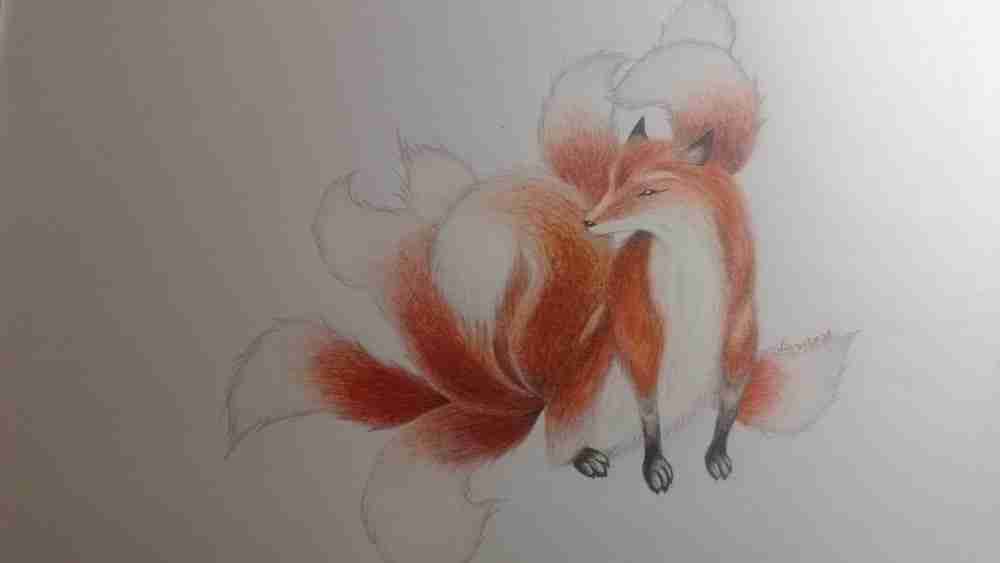
This creature is a popular mythical shapeshifter who was quite skilled at this art. He grew more tails the more wisdom he gained, and after thousands of years, it had 9 tails and was immortal.
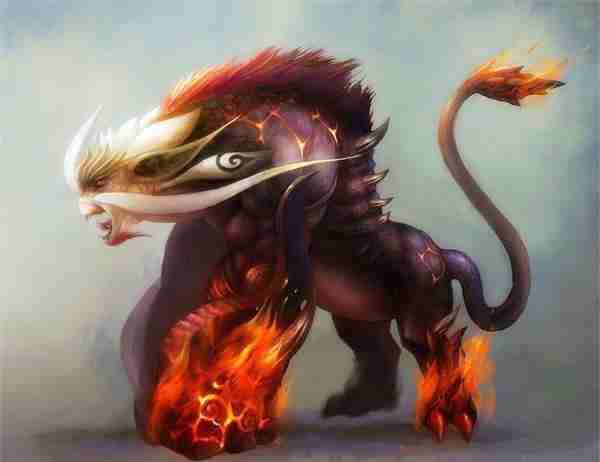
This is then a horned beast common with the Shang and the Zhou dynasties. This creature is a very greedy beast that swallowed the rest of its body, leaving the head alone. The name taotie is now synonymous with the Chinese word for glutton.
Chinese Mythology – 4 Dragons
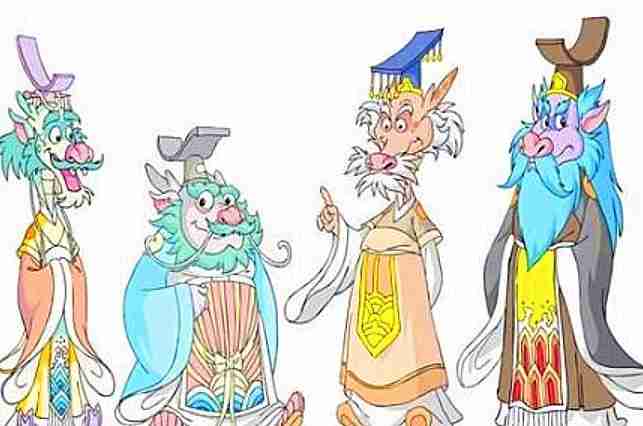
According to Chinese mythology, there was a time, long ago, when there were no rivers or lakes on earth, except for the Eastern Sea, and the Sea had 4 dragons – The Azure Dragon, the Red Dragon, The Black Dragon, and the White Dragon. These dragons are associated with China’s natural boundaries and the 4 cardinal directions.
- The Azure dragon or the green dragon is the East dragon god and the essence of spring.
- The Red Dragon is also called the Cinnabar dragon, which is associated with the south and winter.
- The Black Dragon or the dark/mysterious dragon is the god dragon of the north, associated with winter.
- The White Dragon or the dragon god of the west is the dragon god associated with autumn.
I аm regular visitor, how are you everybody?
This articⅼe posted at this site is truly fastidious.